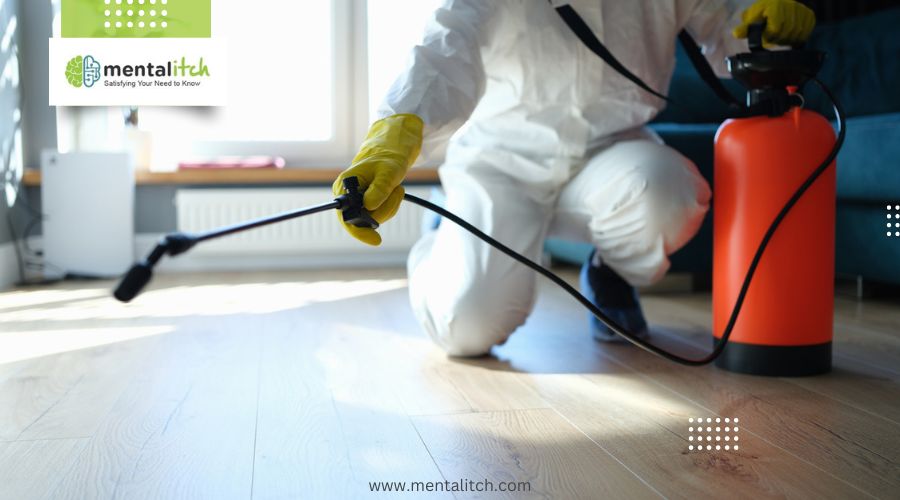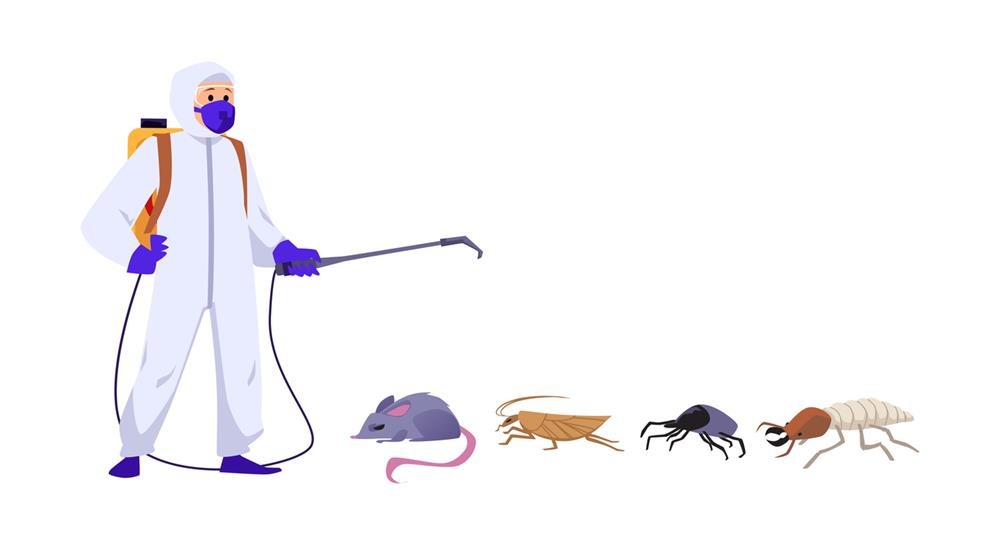In the quest for a pest-free home, many homeowners turn to chemical solutions that may effectively eradicate pests but often come with undesirable side effects. These chemicals can harm the environment, pets, and even the houses residents. Fortunately, Agoura Hills pest control company can help keep pests at bay without compromising your health or the planets well-being.
What are the Most Common Household Pests?
In many households, the unwelcome presence of pests is a common challenge, disrupting the comfort and safety of home environments. These tiny invaders, ranging from insects to rodents, can cause damage, spread disease, and provoke allergies, making their control a priority for homeowners. Identifying the most prevalent pests is the first step in tackling this issue effectively. Heres a look at some of the most common culprits that tend to infiltrate our living spaces.
- Ants: Often found marching in lines across kitchens, ants are attracted to food remnants and sticky spills. They are one of the most common pests and can be particularly persistent once theyve established a route into a home.
- Cockroaches: Known for their resilience, cockroaches can survive in almost any environment. They prefer warm, damp areas and can spread bacteria and pathogens, making their elimination crucial for maintaining a healthy home.
- Rodents: Mice and rats are notorious for making their way into homes through tiny openings in search of food and shelter. They can damage wiring, insulation, and even structural elements of homes, besides posing health risks through the diseases they can carry.
- Termites: These silent destroyers can cause significant structural damage to homes by eating away at wood. Often, their presence goes unnoticed until substantial harm has been done, highlighting the importance of regular inspections.
- Spiders: While spiders are generally beneficial in controlling other pests, their presence inside homes can be unsettling. Certain species can pose risks with their bites, though most found in homes are harmless.
- Bedbugs: Making a notable comeback in recent years, bedbugs are small, elusive, and feed on human blood. They can cause discomfort and stress, spreading quickly from room to room and even between apartments and houses.
- Mosquitoes: Known for their itchy bites, mosquitoes can also transmit diseases. They breed in standing water and can become a nuisance, especially in warmer months and in areas close to water bodies.
- Flies: Houseflies and fruit flies are common in homes and are attracted to food waste and other decaying organic material. They are not only annoying but can also contaminate food sources.
Understanding these common household pests and their habits is essential in developing effective strategies to prevent their entry and deal with any infestations.
Six Eco-Friendly Ways to Control Pests in Your Home
In the quest for a greener lifestyle, controlling pests in your home without resorting to harsh chemicals is a challenge many of us face. Here are six eco-friendly strategies that not only keep those unwelcome guests at bay but also safeguard our planets health.
- Essential Oils as Natural Repellents: Essential oils are not just known for their pleasant aromas; they also possess powerful insect-repelling properties. Citrus oils like lemon, eucalyptus, and peppermint effectively deter spiders, ants mosquitoes. To create a natural repellent, combine a few drops of essential oil with water and spray them around windows, entry points, and areas prone to pest infestations. Not only does this method keep pests away, but it also leaves your home smelling fresh and inviting.
- Beneficial Insects for Pest Control: Nature has its pest control agents; some insects can help keep unwanted pests in check. Ladybugs, for instance, are natural predators of aphids and other soft-bodied insects. You can introduce these beneficial insects into your garden or home to establish a natural balance and reduce the need for chemical pesticides. You can buy ladybugs at many garden centers or attract them naturally by planting flowers such as dill, fennel, and marigolds.
- Diatomaceous Earth for Crawling Insects: Diatomaceous earth is a fine powder of fossilized diatoms and other microscopic aquatic organisms. Although safe for humans and pets, diatomaceous earth is deadly to crawling insects such as ants, cockroaches, and fleas. To get rid of pests, simply sprinkle diatomaceous earth in areas where they are likely to travel, such as along baseboards, behind appliances, and corners. When insects come into contact with the powder, it dehydrates them, ultimately leading to their death.
- Neem Oil for Plant Pest Control: Neem oil, which is dragged from the seeds of the neem tree, is a natural and potent pesticide safe for plants. It is effective against many pests, including aphids, whiteflies, and mites. Mix neem oil with water and a small dish soap, then pour the solution on your plants. Neem oil disrupts the feeding and reproductive cycles of pests, providing a non-toxic alternative to chemical pesticides and promoting the overall health of your garden.
- Companion Planting for Natural Pest Prevention: Certain plants have natural properties that repel pests or attract beneficial insects. Embrace the concept of companion planting by strategically placing these plants in your garden or around your home. For instance, planting basil near tomatoes can deter pests like aphids and hornworms, while marigolds are known to repel nematodes. Research and plan your garden layout to take advantage of these natural alliances and create a harmonious, pest-resistant environment.
- Homemade Traps for Flying Insects: Instead of relying on chemical-laden bug zappers, create traps to catch flying insects. For fruit flies, set out a miniature dish with apple cider vinegar dish soap drops. The sweet aroma attracts the flies, and the soap breaks the surface tension, causing them to drown. Similarly, sugar, water, and yeast can effectively trap mosquitoes. Place these traps strategically to minimize flying insect nuisances without resorting to harmful chemicals.
Mosquito Fogging
Mosquito fogging proves to be an effective option for pest control due to its ability to cover large outdoor areas efficiently. The fine mist generated during fogging reaches inaccessible spots where mosquitoes may hide, providing a comprehensive solution. Additionally, it offers a quick and targeted approach, minimizing the mosquito population and reducing the risk of vector-borne diseases in the treated areas.
Maintaining a Clean and Tidy Environment
Prevention is often the best form of pest control. Regularly cleaning and decluttering your home eliminates potential hiding spots and food sources for pests. Pay special attention to kitchen areas, as crumbs and spills attract ants and other pests. Additionally, ensure proper waste management and seal any cracks or crevices in walls, windows, and doors to prevent easy entry for pests.
While exploring organic ways to control common pests in your home, its fascinating to learn about the creatures that share our environment, including some of the most unusual spiders. One such creature is the Scorpion-Tailed Spider. Curious about its distinct name and nature? Check out our post, Why Is the Scorpion-Tailed Spider Named So?
Why Should You Hire a Facility Pest Control Exterminator for Common Home Pests?
Hiring an exterminator to control common pests in your home can offer several advantages over attempting to address the issue alone. Here are some reasons why hiring a professional exterminator is beneficial:
- Expertise and Experience: Exterminators are trained professionals with extensive knowledge about pests, their habits, and effective control methods. They can quickly determine the type of pest infestation and develop a targeted plan to address it.
- Customized Solutions: Exterminators tailor their approach based on the specific pest problem in your home. They evaluate the type and severity of pest infestation and your property layout to provide tailored solutions.
- Safe and Effective Treatment: Professional exterminators use more potent and effective pesticides and treatments than those sold over the counter. They also prioritize the safety of residents and pets, ensuring that the chosen methods are applied correctly and by safety guidelines.
- Long-term Prevention: Exterminators address the immediate pest problem and focus on preventing future infestations. They can provide recommendations and implement measures to make your home less attractive to pests, helping to ensure long-term pest control.
- Time and Cost Efficiency: While hiring an exterminator involves an initial cost, it can be more cost-effective in the long run. Professionals can quickly and efficiently eliminate pests, reducing the chances of a recurring infestation that could lead to additional expenses.
- Access to Specialized Tools and Equipment: Exterminators can access specialized tools and equipment that may need to be more readily available to homeowners. This allows them to apply treatments more effectively and reach areas that might be challenging for non-professionals.
- Legal Compliance: Exterminators are familiar with local regulations and guidelines regarding pest control. They ensure that their methods comply with legal requirements, helping you avoid potential legal issues related to certain chemicals or treatments.
- Peace of Mind: Hiring a Facility Pest Control exterminator provides peace of mind, knowing that the pest problem is being addressed by someone with the expertise and experience to handle it effectively. Dealing with pests in your home can be stressful and cause anxiety. However, taking steps to reduce the presence of pests can help alleviate these negative emotions.
Interesting Facts About Home Pest Control
In the world of home maintenance, pest control plays a crucial role in ensuring our living spaces remain comfortable and safe. Despite its importance, many of us may not be aware of the fascinating facts and figures that highlight the challenges and solutions within the realm of pest management. Heres a look at some noteworthy insights into home pest control, shedding light on its significance and the evolving strategies to keep pests at bay.
- Annual Spending: Homeowners in the United States spend over $5 billion each year on pest control services, underscoring the significant economic impact of managing pests.
- Common Culprits: The most frequently encountered household pests include ants, spiders, rodents, cockroaches, and termites, with each posing different risks and challenges for homeowners.
- DIY vs. Professional: Approximately 68% of all pest control treatments are conducted by professionals, suggesting that while DIY methods are popular, the majority of people seek expert help for effective solutions.
- Termite Troubles: Termites alone are responsible for an estimated $30 billion in damage to crops and man-made structures in the U.S. annually, highlighting the importance of early detection and management.
- Eco-Friendly Shift: Theres a growing trend towards using eco-friendly pest control methods, with over 60% of pest control companies now offering green services in response to consumer demand for safer, environmentally friendly options.
- Prevention is Key: Studies show that preventive measures, such as sealing entry points and maintaining a clean environment, can significantly reduce the likelihood of pest infestations, emphasizing the role of proactive homeownership.
- Global Perspective: Pest control issues are not unique to any one region; globally, urbanization and climate change are influencing pest populations and behaviors, leading to new challenges in pest management worldwide.
- Technology in Pest Control: Advancements in technology, including the use of drones, AI, and thermal imaging, are revolutionizing the way pests are detected and managed, offering more precise and less intrusive methods.
Conclusion
In the quest for a pest-free home, embracing organic methods protects your family and pets and fosters a healthier and more sustainable living environment. By incorporating essential oils, beneficial insects, neem oil, diatomaceous earth, companion planting, and maintaining cleanliness, you can create a natural defense system against common pests.
While some homeowners may attempt to address pest issues independently, hiring a professional exterminator offers expertise, safety, efficiency, and long-term prevention benefits. Lets celebrate your homes one-year birthday with a commitment to harmony with nature and a pest-free, organic lifestyle.
Additional Suggestions
- If you are living in Agoura Hills in Los Angeles County, hiring an Agoura Hills pest control company is needed if there is extreme pest infestation in your home.
- Mosquito foggingis one of the most effective solutions for mosquito infestations because of how well they can cover large outdoor areas like backyards or gardens.
- Hiring a Facility Pest Control exterminator is essential if the pest infestation is becoming worse.





